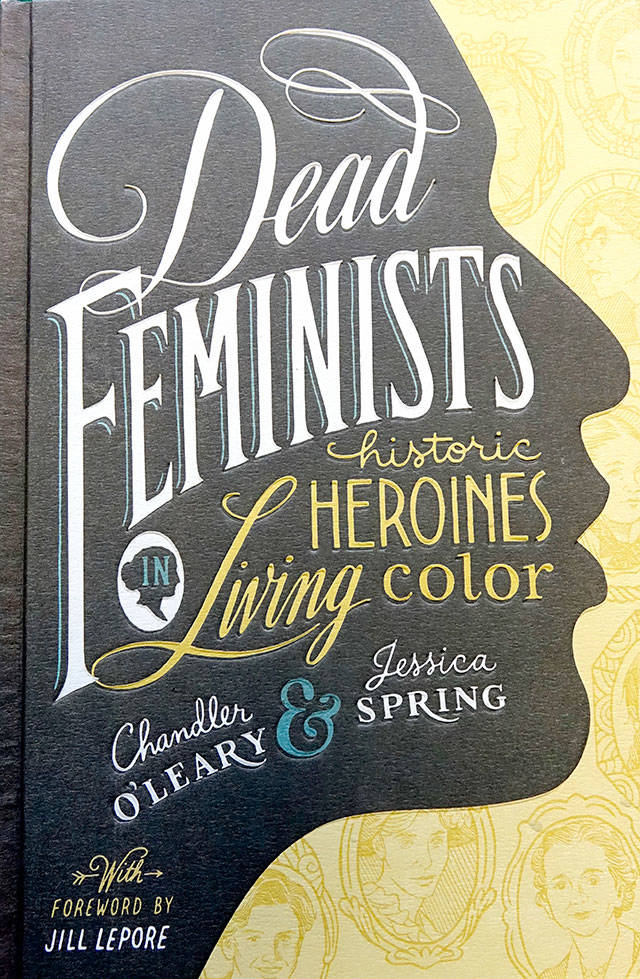A Tacoma-based duo that has made a splash in feminist and publishing circles with their book, “Dead Feminists: Historic Heroines in Living Color,” will present a talk about their work at 7 p.m. Sunday, March 1, at Vashon Center for the Arts.
“Dead Feminists,” which began in 2008 as a series of limited edition broadsides, is the collaborative effort of illustrator Chandler O’Leary and letterpress printer Jessica Spring.
Each lavishly colorful broadside — an art form with images and text that O’Leary defines as the “great-grandmother of the poster” — is a tribute to women who made a difference in their era’s political and social milieus. The series includes such women as Frida Kahlo, Gwendolyn Brooks, Shirley Chisholm, Rachel Carson, Marie Curie and Harriet Tubman, to name only a few.
But not only images of the famous women fill the broadsides. In keeping with the form, all the works also include inspiring quotes and additional text, written by Spring and O’Leary, that brings their subjects’ wisdom to bear on current-day issues as climate change, health care reform, marriage equality, and persistent racism and violence in American culture.
The series, after its launch, became so popular that the women were encouraged to produce a book that would expand upon the information in their 24 broadsides.
“Dead Feminists,” the book, was published in 2016, with an introduction by best-selling writer Jill Lepore. Since then, O’Leary and Spring have continued the project and created five additional broadsides.
All the works can be seen at deadfeminists.com, an expansive website that details the passion and purpose behind each print — all of which have overtly and proudly progressive political content.
The book has received rave reviews and wide distribution.
Author Briallen Hopper, writing in the Los Angeles Review of Books, called it “a book for the long haul … simultaneously a finished work of art, a lavish visual representation of an ongoing creative process, and a practical model of how to sustain friendship, creativity and purpose through a deep sense of history and a commitment to the future.”
In a phone interview, O’Leary spoke about her long collaboration with Spring, saying that each brought different strengths and points of view to their work together. But she also credited a third collaborator.
“We’re collaborating with our audience as well,” she said, explaining that the broader purpose of the series is to use history to contextualize current events. “People give us a lot of feedback because we’re talking about real things that happen to real people. History is not dead, it is very much alive and relevant.”
The March 1 talk by O’Leary and Spring, part of VCA’s Talks on the Rock series, will be introduced by Vashon book artist Suzanne Moore. The discussion will include mention of the duo’s portraits of women suffragettes, a timely topic in this election year featuring several female presidential candidates.
But according to O’Leary, she and Spring have felt an urgency to broaden their work beyond the very white, homogeneous group of suffragettes, and to expand the discussion of suffrage to emphasize that “voting and democracy are still not settled questions, and it is still not an equal right for everyone in America.”
When asked about the reach of their efforts, O’Leary said that they were pleased that many librarians and teachers around the country — both at the higher-ed and high school levels — have used the book in their women’s studies, history, design, and book arts curricula.
Spring, in a separate phone interview, also said it had been gratifying to see the attention paid to their work, especially in the current polarized political climate.
“I think when we first started, there weren’t as many women talking out loud the way we were, but in the ensuing years, it’s gone from a solo to a chorus,” she said.
Echoing O’Leary, she said that an important part of the collaboration was to expand the focus of their work to make it broadly inclusive of influential and inspiring women of many different races and ethnicities, across a broad swath of human history.
Spring and O’Leary’s work is now a part of over 40 public collections around the country, including the National Museum of Women in the Arts, the Radcliffe Institute, the Seattle Art Museum, Smith College, the University of Washington and Stanford University.
They are currently the lead designers and curators of an exhibition on the centennial of women’s suffrage at the Washington State History Museum in Tacoma, which will run from April 9 to Aug. 30. This summer, the two women will also present a series of talks at public libraries, centered around the Dead Feminists and the women’s suffrage centennial, as well as the Black suffrage movement.
Central to their mission as artists, they said, is to encourage women to draw courage and inspiration from the feminists. For this reason, a portion of the profits from the sale of their book and limited edition prints go to local and national causes led by women of all ages.
Spring is the proprietor of Springtide Press, where she designs, prints and binds unique artist books, broadsides and ephemera incorporating handmade paper and letterpress printing.
O’Leary is an illustrator and lettering artist who creates her own line of prints and paper goods under her in-house brand Anagram Press. She also does lettering and illustration work for publications throughout the country, and posts her sketchbook drawings on her illustrated travel blog, “Drawn the Road Again.”
Currently, she is at work on her second illustrated travel book, about the islands in the Salish Sea. The book, to be published in 2022, will include a chapter on Vashon.
Yet despite all their separate activities, Spring said she hopes her collaboration with O’Leary will continue.
“It’s kind of a marriage, in a way,” Spring said. “I might have an idea and I wouldn’t have the gumption to get it across the finish line, but together we can.”


